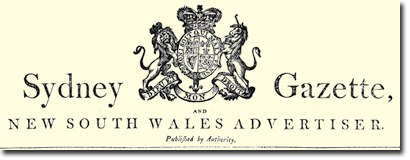
|

Parramatta Native Institution
13 April 1819
On Tuesday last an Anniversary School Examination took place at Parramatta, at which the children of the Native Institution were introduced, their numbers not exceeding twenty; those of the schools of the children of Europeans amounting nearly to a hundred. Prizes were prepared for distribution among such of the children as should be found to excel in the early rudiments of education, moral and religious; and it is not less strange than pleasing to remark, in answer to an erroneous opinion which had long prevailed with many, namely, that the Aborigines of this country were insusceptible to any mental improvement which could adapt them to the purposes of civilized association, that a black girl of fourteen years of age, between three and four years in the school, bore away the chief prize, with much satisfaction to their worthy adjudgers and auditors. Other prizes were designated to children of much desert; and it was declared generally that the attention paid to their instruction by their various instructors was entitled to much praise for their zeal in so good a cause, manifested in the improvement of their pupils. At the time His EXCELLENCY GOVERNOR MACQUARIE was pleased to institute and patronize the Institution for the maintenance and instruction of these poor children, it was considered by very few otherwise than as a benign wish to withdraw them from a condition which had no rank in the scale of human nature; but under this benign auspices, aided by the zealous exertions of the Gentlemen appointed to its Committee, we have already the happiness of contemplating in the infant bud the richness of the expanding flower. That they might have been for many years to come reserved for the contempt of the more enlightened world no doubt may be formed; but do not all late accounts inform us that the black natives of Africa are in the exercise of high offices in St Domingo; which they not only conduct with precision, but fill with a degree of urbanity (which may nevertheless be more confined to the reception of strangers than to common habit) and why then should we despair of these poor people being equally redeemable from their state of abjection, which was in itself but natural to persons whose only associates were the animals of the forest.
It is true, that repeated instances in our natives, has occasioned their adapting themselves in youth to European manners, and in the end retreated to the woods to rejoin their kindred: but in this there can be nothing to be wondered at: that state amongst the white population that was assigned to them was possibly little better than the one they had forsaken; the meanest offices of drudgery always reflecting upon their minds a picture of debasement, a want of attention to their common wants, of which our very dogs and horses had not to complain. Such treatment could not be considered a fair trial of their capacities or fixed inclinations. On the contrary, it was sufficient to disgust instead of withdrawing them from habits which at maturer age appeared to themselves to be even less intolerable, in a Gazette ten years ago we recollect ascribing to another cause their voluntary return to original habits. Man cannot be happy without society, for nature has enriched man with a mind which unfits him to the state of solitude. A poor native boy in a kitchen was worse than in a state of solitude; for he had constantly, and the more so as he improved in faculty, to lament a debasement which nature alone had stamped upon him. There is an associate which man in every condition finds congenial to his wishes; the smallest bird has its mate; the untamed lion of the forest defends his den, and protects his yet inoffensive family of yelping cubs; out of the woods the poor half civilized native had no chance of a mate; no chance of ever sharing in the tender feelings of a parent, which the very crocodile evinces. The doubt of their capacity and fairness of intellect must now wear off; and it will no more be doubted that this our infant Native Institution will prove eventually honorable to its earliest Patronage, and add additional honor to the Country whose benevolent efforts are sounded throughout all parts of the habitable world.
Background Information
The Aboriginal girl of 14 who won the first prize in the anniversary school examination, ahead of twenty children from the Native Institution and almost 100 European students was probably the young woman later known as Maria Lock (c1805-1878). She was the daughter of Yarramundi, 'Chief of the Richmond Tribes' whose family belonged to the Boorooberongal clan of the D(h)arug people.[See: entry in the Biographical Register]
Top of page
Provenance
Sydney Gazette 17 April 1819 pp.2d-3a.
Return to: 1819 |
Documents
|



